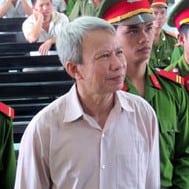Vietnam Free Expression Newsletter No. 5/2020 – Week of January 27-February 2
Featured Image: Political prisoner Ngo Hao, who was temporarily released from prison for medical reasons
Greetings from The 88 Project! We are bringing you news, analysis, and actions regarding human rights and civil society in Vietnam during the week of January 27-February 2. Political prisoner Ngo Hao will be on temporary suspension of his 15-year prison sentence for the next year as he receives medical treatment; the authorities’ decision to grant the medical suspension comes after Hao previously suffered from two strokes in prison and after two political prisoners died in prison in late 2019. Phan Kim Khanh and Nguyen Viet Dung are both in solitary confinement in Ba Sao prison camp and Vuong Van Tha is being denied food in prison because of his refusal to wear a prison uniform and sign a confession of guilt. In international advocacy, read Amnesty International’s 2019 report on human rights in the Asia-Pacific region, and read about Tran Thi Nga, who received an international human rights award this week. In the news, read about Vietnam’s foreign policy. Take action for Khanh, Dung, and Tha by sharing updates on their situations and calling for improvements in their prison conditions.
HUMAN RIGHTS & CIVIL SOCIETY



As we reported last week, Phan Kim Khanh is in solitary confinement for allegedly “rebelling” against the prison administration. There is a noticeable deterioration in his health, possibly due to malnutrition. The family has called for the help of civil society organizations. Now, it is also reported that Nguyen Viet Dung is also in solitary confinement for the same reason, as well as for “refusing to work.” On January 7, 2020, Dung‘s family went to visit him, and compared to the previous visit in June, he seemed to be in better spirits, yet there are still concerns about his health. According to the family, at that time, he had been barred from buying food at the prison canteen and was only allowed to access the meals provided by the prison, resulting in a lack of nutritional variety. Dung and Khanh are both currently in solitary confinement at Ba Sao prison camp in Ha Nam prison and both are in the process of trying to appeal their sentences, but at different levels of the appellate process. Khanh, a student blogger, is serving a six-year sentence, and Dung is the founder of the unsanctioned Republican Party of Vietnam and is also serving a six-year sentence.


- Facebooker Huynh Thi To Nga, arrested January 28, 2019, after being kidnapped from her workplace, and later sentenced to five years in prison

- Blogger Truong Duy Nhat, arrest anniversary January 28, 2019 (after being kidnapped from Thailand two days prior), and birthday January 31– still awaiting trial

- Activist Duong Thi Lanh, arrested January 30, 2019, and later sentenced to eight years in prison



Tran Hoang Phuc, Nguyen Van Dien, and Vu Quang Thuan
- Student activist Tran Hoang Phuc, and video bloggers Nguyen Van Dien and Vu Quang Thuan, tried on January 31, 2018, and sentenced to six, 6.5, and eight years in prison, respectively

Phan Van Thu, leader of the An Dan Dai Dao sect, sentenced to life in prison
- 22 members of An Dan Dai Dao Buddhist sect, arrested in February 2012 and tried in January 2013, in what is called the “Council for the Laws and Public Affairs of Bia Son” affair
NEWS & ANALYSIS
Will Vietnam’s anti-corruption campaign endure beyond Trong?, Le Hong Hiep, East Asia Forum, January 29, 2020: “The unprecedented campaign has improved Vietnamese public confidence in CPV leadership and cemented Trong’s political position. Unlike the previous term of office when his authority was challenged by former prime minister Nguyen Tan Dung, Trong’s power and control over the political system have been strengthened. This enables him to single-handedly shape the Party’s agenda, including making personnel arrangements for the upcoming Party Congress.”
What’s Next for Vietnam’s Maritime Militia?, Prashanth Parameswaran, The Diplomat, January 28, 2020: “The focus on the development of Vietnamese maritime capabilities has continued over the past few years as well. Vietnam has considered or passed a series of resolutions and laws that further clarify the role of various forces including its coast guard, and has also been managing some of the maritime challenges with its neighbors such as illegal fishing. More broadly, the country has also framed the development of its maritime capabilities in terms of broader goals such as developing its economy and protecting its sovereignty, as evidenced in the release of the country’s first defense white paper in a decade in November.”
Vietnam’s Foreign Policy, Carl Thayer, in The Sage Handbook of Asian Foreign Policy: “This chapter is divided into four sections. Section one examines Vietnam’s adoption and implementation of the foreign policy of ‘multilateralizing and diversifying’ its external relations up to 2005. The year 1995 was pivotal, Vietnam normalized its relations with the United States and became a member of the Association of Southeast Asian Nations. Section two explores Vietnam’s pursuit of strategic and comprehensive partnerships with Russia, Japan, India, China, European states and Australia, as well as Vietnam’s engagement with multilateral institutions in the period from 2006 to 2010. Section three assesses Vietnam’s consolidation of relations with the major powers, new strategic partnerships, and the South China Sea issue in the period from 2011 to 2016. Section four, concludes that Vietnam’s policy of ‘multilateralizing and diversifying’ its external relations was largely successful but the maritime dispute with China over the South China Sea poses major challenges to Vietnam’s attempt to maintain its autonomy and independent foreign policy.”





